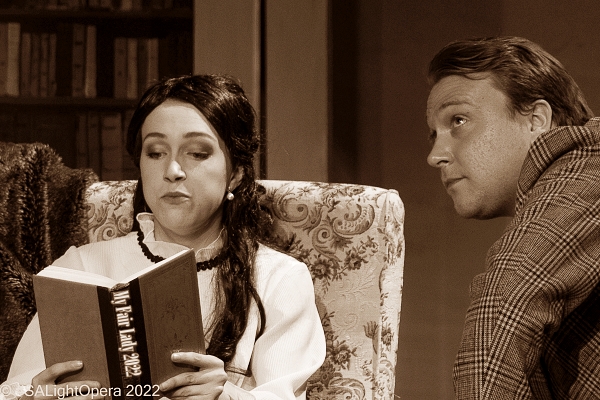Director Maria Davis assembled a well-matched cast and gave us an entertaining performance of this well known and widely loved musical. Together they managed both the humour and Shaw’s sharper social observations rather well.
Delanie Whibley shone in the role of Eliza, and warmed the audience’s hearts from the very outset. She drew the necessary strong contrast between the flower girl and the “fair lady”, and showed dramatic skill in both. She was raucous and feisty in the one and absolutely charming in the other, while keeping her character’s inner strength throughout. Her songs were a delight, full of life and character.
Adam Schultz had a number of strong moments as Henry Higgins, especially in his archness and self-absorption. He was animated and articulate and drew gasps from the large opening night audience with his forceful delivery of Higgins’ harshest criticisms of Eliza.
Russell Ford was gentlemanly and avuncular as Colonel Pickering, providing a reliable and constant contrast to the irascible Higgins. He gave all his scenes the required sense of courteous decency. Likewise, Aled Proeve was decency itself as Freddy. He gave the role an engaging vulnerability and a love-sick weakness which endeared him to us all.
Those playing the three mature women were especially impressive. Bronwyn Calvett was a warm, empathetic and competent Mrs Pearce, while Bernadette Abberdan, as Mrs Higgins, graciously yet forcefully dealt with her son Henry, while successfully overcoming the character’s snobbery to side with Eliza. Margaret Curd was classy and authentic as Mrs Eynsford Hill.
John Martin pretty well perfected the character, voice and attitudes of Alfred Doolittle. His songs were a hit, but suffered somewhat from some slipped lines. However, he pressed on with gusto and had the audience well and truly entertained.
A number of the ensemble pieces worked especially well. The male chorus supporting Eliza’s and Doolittle’s solos were well balanced and supportive as was the chorus of Higgins’ household staff, especially in the scene following the ball.
The small orchestra, under the baton of MD Helen Loveday was, after a tense start, tuneful and sympathetic to the singers.
Unfortunately they were left high and dry at times, when having played the scene change transition music, they observed the curtain remaining steadfastly shut for a long time, while the often noisy set changes took place. I’m sure that will be resolved in time for subsequent performances.
On the whole, the production held our attention, was true to its origins and was definitely entertaining.



